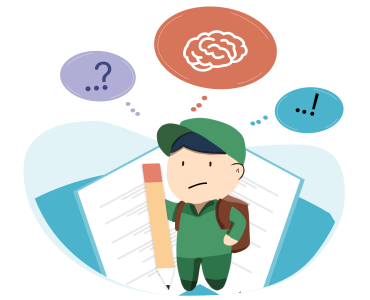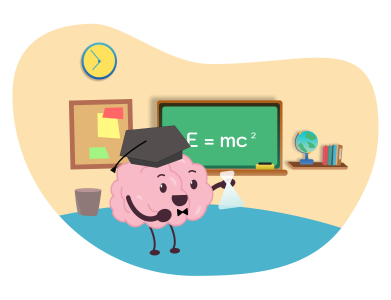
- GRIP Learning's Team
The term "metacognition" refers to the act of reflecting on one's own cognitive processes. It's the method of organizing, assessing, and evaluating students' progress toward goals.
Grit is a trait of someone who is able to stay focused on a long-term objective despite several setbacks and challenges. Hard work, perseverance, discipline, dedication, and sacrifice are all necessary to achieve the most desired outcomes. Those who have true grit see setbacks not as an excuse to give up but as chances to learn and improve for the next time around. Being gritty is not something you want to do that requires less effort. Instead, you have to be ready to risk everything in pursuit of your objectives. You can be incredibly talented, but if you don’t put in the work, you’ll never succeed. Students would do very well in school and in their careers if they knew this trait.

Grit is the willingness and ability to persevere through adversity in order to achieve one’s goals, whether they be personal or career-related. It matters because it is a key factor in success and achievement. It’s a potent weapon that can help you rise above the competition even if your actual abilities aren’t particularly impressive.
You don’t have to be talented or intelligent to be gritty or successful. They are important, but working hard and being passionate about the things you want are more essential. Possessing characteristics such as resilience (the capacity to recover quickly from setbacks), perseverance, a growth mentality, and an optimistic outlook will increase your chances of achieving your goals. According to Duckworth’s research, she discovered that the best predictors of success were not IQ but rather traits like perseverance, self-discipline, independence, and drive. Moreover, based on some research, those students who put in the most effort achieved the best results, while those who did not got a lower score.
1. Help them find their Passion – There is no such thing as a “passion” for most kids, but you can assist them to discover their interests and pursue them. Encourage them to try different activities where they can find what interests them. If you give kids the freedom to follow a passion of their own, they’ll be more motivated to put in the effort and stick with it if that’s necessary to achieve their goals.
2. Tell them that it is okay to fail and make mistakes – Tell them that their failures and mistakes don’t define them, but how they stand up after that matters. Tell them to take those failures as a lesson and to be more powerful. Talk to them about your failures and how you coped, the positivity and courage you mustered to stand again. By sharing your personal stories of setbacks with your children, you may show them that it’s possible to overcome adversity and find success in the end. Children learn from what they see and hear around them, so it is crucial for parents to provide an example of perseverance and resilience for their children.
3. Let them Struggle – It is hard to see your child struggle and be frustrated over something, but letting them struggle is an effective way for them to learn. Do not rush in to rescue your child or let them give up at the earliest sign of difficulty when teaching them a new skill, dealing with schoolwork or activities that are challenging for them. If you let your child give up at the first sign of difficulty, they’ll learn that struggle isn’t a necessary element of hard work. And if they don’t push through, they may never know what kind of success they were capable of achieving. Letting them feel frustration and sadness will help them develop resiliency.
4. Reflect Together – Help your children to reflect on what they are doing and what they are lacking. Help them think of a plan and strategies and what steps they should take to keep going. There are times they will get really frustrated and lost, but never ever teach them the word “quit”. Instead, teach them to take a rest for a while, then move forward again. Children develop resilience and perseverance when they realize that school isn’t supposed to be a breeze and that struggling with a subject doesn’t make them a failure.
5. Show a Growth Mindset – Be mindful of the words and actions you deliver to them. Talk positively about your accomplishments and mistakes, and let them realize that talents and capabilities can be improved by effort, hard work, and perseverance, and that making mistakes is part of the learning process.

Being gritty is one of the most effective ways to achieve your goals and dreams. You have access to the things you want to do or not. Having grit means you have accepted your life’s circumstances and you find comfort from discomfort. You devote yourself to projects that excite you, and the thought of quitting never enters your mind, which helps you to become so successful.
Aside from being successful, having high grit gives you the power to be happy and enjoy life. Since you know what you want in life, those activities, schoolwork, and projects won’t bother you because you know how to stand again even if you fall from these challenges. Salles et al. (2014) and Vainio (2015) stated in their studies that grittier people tend to be happier, more fulfilled, and in better mental health.
Moreover, students with high grit consider failure and making mistakes as a normal part of their learning process. They know how to plan and make strategies to keep going after setbacks.
Confidence is also one of the benefits because grit leads to more success, and success boosts self-esteem. You will be confident in every situation you face because you are not afraid, no matter how bumpy your life becomes.
Vainio, M. M., & Daukantaitė, D. (2015, November 17). Grit and different aspects of well-being: Direct and indirect relationships via sense of coherence and authenticity – journal of happiness studies. SpringerLink. Retrieved September 21, 2022, from https://link.springer.com/article/10.1007/s10902-015-9688-7?error=cookies_not_supported&code=5f4ab5a6-2d41-4731-923c-ba9aaa289e51
Sales, A., Cohen, G. L., & Mueller, C. M. (2014, February). The relationship between grit and resident well-being. Define_me. Retrieved September 21, 2022, from https://www.americanjournalofsurgery.com/article/S0002-9610(13)00603-X/fulltext




